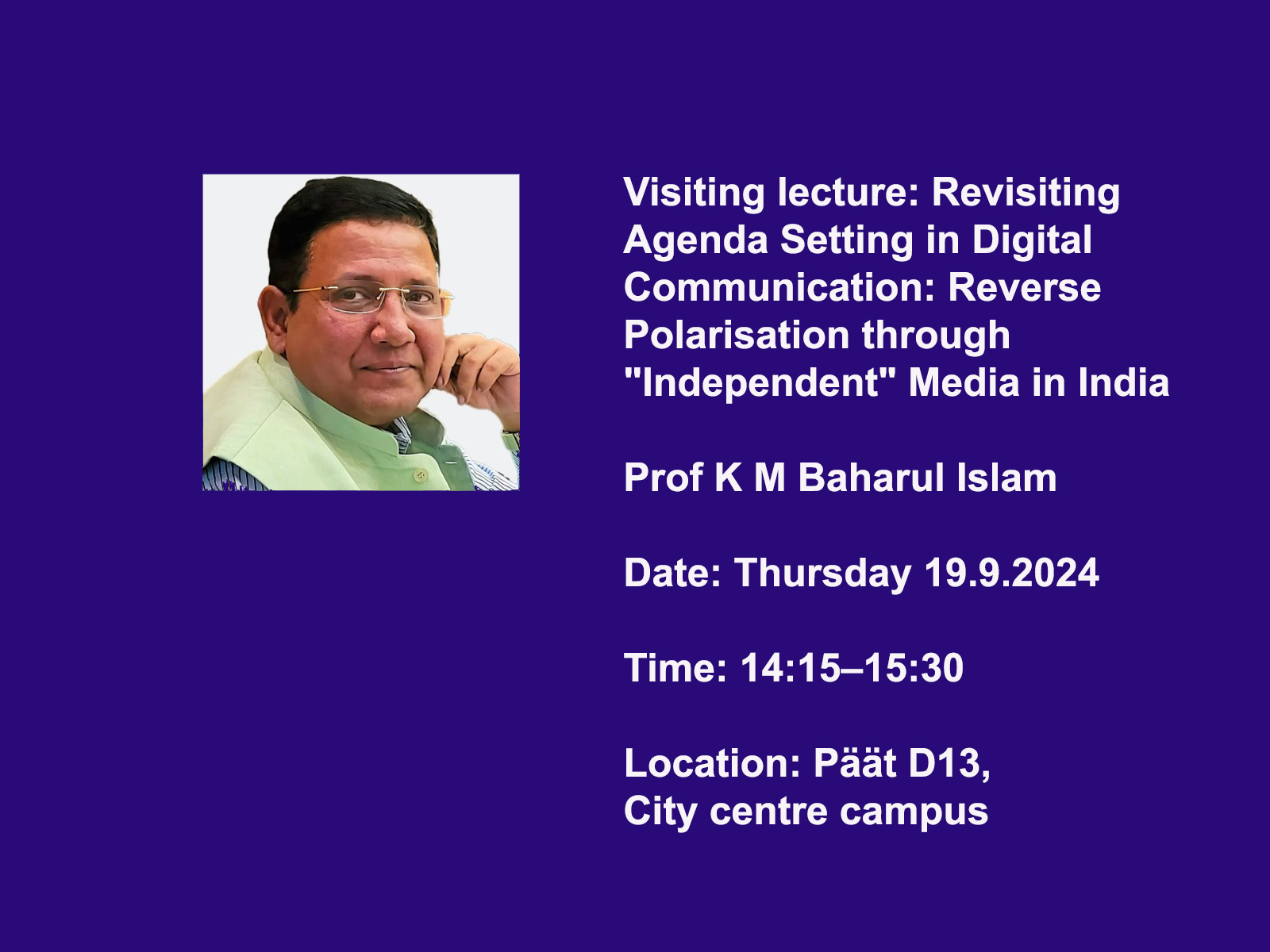Title: Revisiting Agenda Setting in Political Communication: Lessons from election campaigns in India. The abstract is as attachment.
Date: Thursday 19.9.2024
Time: 14:15–15:30
Location: Päät D13, City Centre Campus
Brief Profile
Prof K M Baharul Islam is a development communication specialist who has been working for more than thirty years in the areas of communications, development, public policy and governance issues. He is a Professor of Communications and the Chairperson of the Centre for Public Policy and Government at the Indian Institute of Management Kashipur. He is also a Visiting Professor at the London School of Economics. He taught in various universities in Asia and Africa and served on several assignments with the United Nations. His major works include e-Government Strategy and the National ICT Policies for many African countries.
Prof Islam has a D.Litt., two PhDs, MA, MBA, LLM and B.Ed. Degrees. He did his post-doctoral study at the Asian Institute of Technology, Bangkok. He studied at AMU Aligarh, Tezpur University, Strathclyde University (UK), Harvard Business School and the University of Bern, Switzerland. He is also a Fellow of the Royal Asiatic Society of Great Britain, Indian Institute of Advanced Study, Shimla, KAICIID Dialogue Centre, Vienna and the US-India Policy Institute at Washington DC. He has published widely and has several books and research articles to his credit. His latest works include a volume on Literatures of the Northeast from Routledge and a major textbook on Business Communication from Wiley.
Lecture abstract:
India, with a population of over 1.4 billion people, conducts elections on a massive scale, allowing citizens to vote in national, state, and local elections. The country’s democratic framework is based on a parliamentary system, with a President as the head of state and a Prime Minister as the head of government. India’s television industry is vast, with over 900 channels connected to ten million paying subscribers-households. However, these channels are often criticised for hosting highly polarised debates and talk shows harping on communal rifts among Hindus and Muslims in India. Media researchers have found links between communally polarising content in television news content, particularly during elections, and political agenda setting with an ulterior design to influence voters.
A mixed approach was used to investigate the polarisation of voters in the UP election in 2022 and the general election in 2024, combining in-depth interviews and content analysis. The content analysis revealed major themes such as voting in areas with large Muslim populations and the fragmentation of backward castes. The 2024 general election resulted in the ruling party, BJP, losing 63 seats despite focusing on Hindu-Muslim issues such as the construction of the disputed Ram temple and Muslim reservation.
An ongoing study on political communication highlights the intricate dynamics between media, political agenda-setting, and voter behaviour in India’s democracy. India’s media landscape, especially TV channels, often hosts polarising debates that highlight communal tensions, particularly between Hindus and Muslims. This framing is related to agenda-setting theories that influence public perception. In the Uttar Pradesh (UP) elections in 2022, media content and political strategies aimed to polarise Hindu-Muslim relations anticipating this would benefit the ruling Bharatiya Janata Party (BJP). However, in the national elections of 2024, BJP’s focus on Hindu-Muslim polarisation, including issues like the Ram temple and Muslim reservations, failed to resonate as expected, resulting in a significant seat loss.
The results revealed a shift in voter priorities, highlighting issues like unemployment over communal narratives. This underlined a trend of “reverse polarisation,” where traditional political communication strategies based on polarisation saw diminishing efficacy. The study suggests that for future campaigns, political strategists must recognise the evolving voter sentiment in India, as reliance on polarising agendas may have a limited impact. This shift signifies a redefinition of traditional agenda-setting theories, as voters increasingly reject divisive narratives in favour of pressing socio-economic issues.
The ongoing research on election campaigns in India showed a new trend of ‘reverse polarisation’, which redefined the traditional agenda-setting theorisation and mitigated these agendas against the prevailing discontent among voters over rising unemployment. In a 2022-2024 comparative scenario, the theorisation emerging from the study predicts a shelf-life on any polarisation-oriented political communication strategy. Campaign strategists who will be engaged in political campaigns in the future must not ignore these emerging signals from the ground of the world’s largest democracy.

